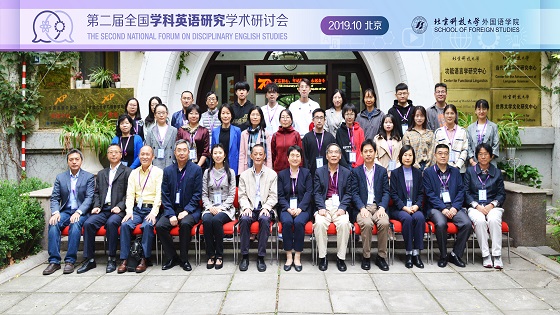The Second National Forum on Disciplinary English Studies

In this golden autumn season, the beautiful scenery can be found in every corner of the University of Science and Technology Beijing (USTB). Hosted by the China Association of Functional Linguistics and orgnanized by the School of Foreign Studies of USTB and the Center for Functional Linguistics at USTB, the Second National Forum on Disciplinary English Studies was held on the morning of October 12th at USTB.
To further play a vital role in the cultivation of high-level foreign language talents and the reform of the discipline of Foreign Language and Literature , dozens of experts and scholars from leading higher education institutions at home and abroad, including the University of Florida, Shanghai Jiao Tong University, Xiamen University, Beihang University, Southwest University, Shenzhen University and Guangdong University of Foreign Studies, assembled in USTB to discuss and study the wording in disciplinary English. There were 8 keynote reports and 3 sub-forums.
Professor Chen Hongwei, dean of the SFS, addressed the opening ceremony of the forum in the Academic Hall of the SFS Building. First, she expressed her warm welcome and sincere thanks to the participating experts and scholars, and pointed out that China and other parts of the world are experiencing a great era with tremendous changes; and many major language-related questions need linguists to answer them, including disciplinary English studies. With the development of globalization and the proposal of the “Belt and Road” Initiative, disciplinary English studies are significant for the training of high-level foreign language talents and the reform of the discipline of Foreign Language and Literature. In her opinion, acquiring disciplinary knowledge is learning language to some degree, so only when the language features of each discipline are analyzed from the perspective of linguistics can the disciplinary knowledge be better obtained . Finally, she hoped that the forum would stimulate academic research and promote the sharing of academic resources so as to accelerate the collaborative innovation of language discipline and language-related interdisciplines.
Then, Peng Xuanwei, the distinguished professor of Shenzhen University and chair of the China Association for Functional Linguistics, an affiliate of the China Association for Comparative Studies of English and Chinese (CACSEC) made three suggestions taking the English studies of physics as an example. First, design textbooks according to a language blueprint so as to serve language teaching. Second, continue to focus on Hallidayan paradigms to expand and deepen the theory of systemic functional linguistics, such as conceptual systems and grammatical metaphors, so as to find new focuses for disciplinary English and Chinese studies. Third, cooperate and exchange with experts and scholars to deepen these studies. Finally, he appealed to young scholars to, to be prepared to alter those focuses if necessary, a, and to broaden their academic horizons.
Undertaking the Second National Forum on Disciplinary English Studies not only shows USTB’s academic influence in functional linguistics but also has an important impact on the all-round development of language discipline inUSTB and in solving problems in language teaching. The School of Foreign Studies of USTB will launch continuous teaching reforms by conducting language research and makinglinguistics a brand specialty.

